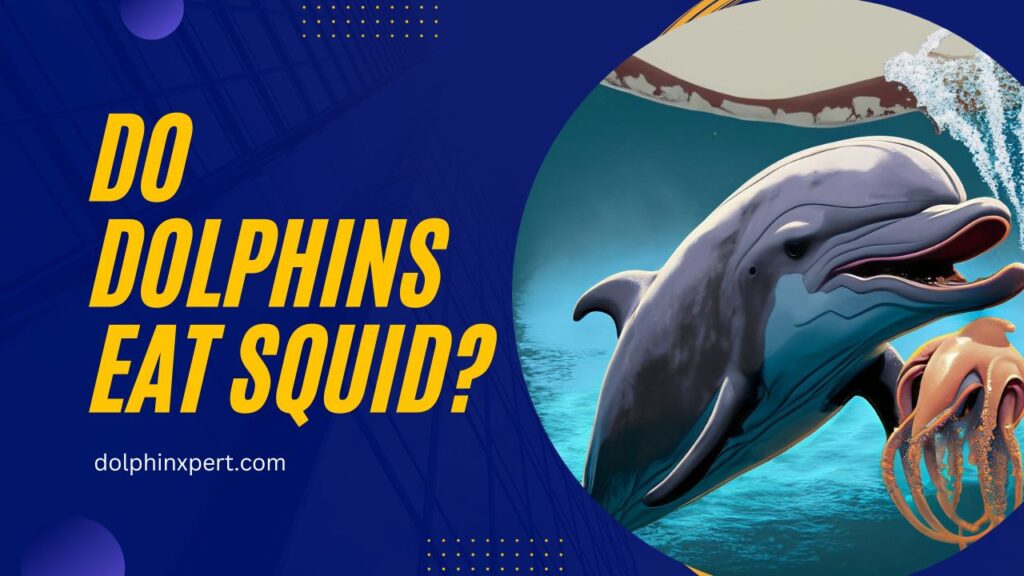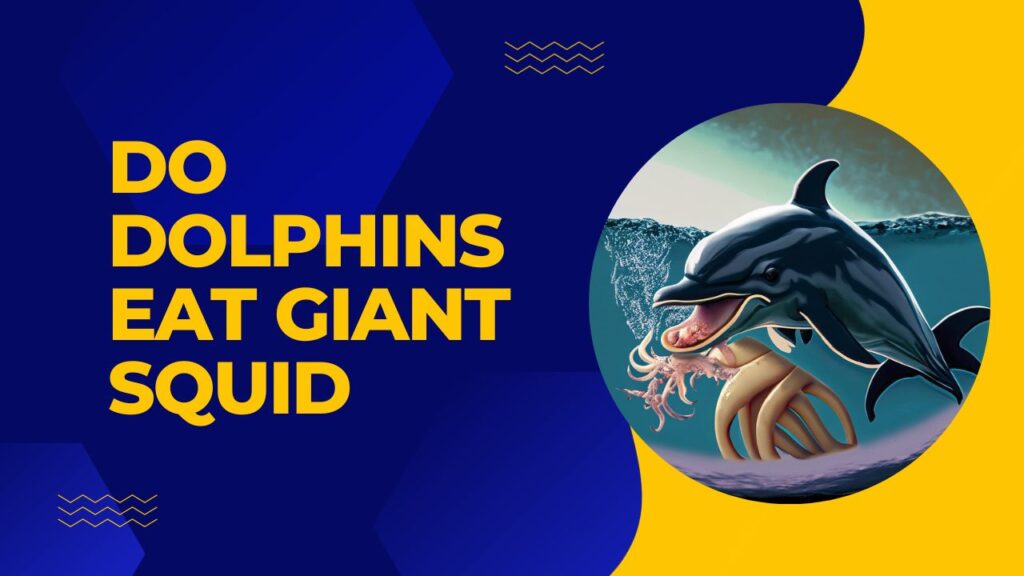
Humans have always been fascinated by dolphins due to their playful nature and impressive intelligence. One common question that arises is do dolphins eat squid?
In this blog post we will explore this query and dig into the captivating world of dolphins and their culinary preferences.
Table of Contents
Do Dolphins Eat Squid?
Yes, dolphins eat squid. Squid are a common prey item for dolphins, and they make up a significant portion of the diet of some dolphin species. For example, Risso’s dolphins are known to specialize in eating deep-sea squid.
Dolphins use their echolocation abilities to locate squid in the water. Once they have found their prey, they will use a variety of hunting techniques to catch it, such as herding the squid into a group or stunning it with their tails.
Squid are a good source of protein and other nutrients for dolphins. They also help to keep dolphins’ teeth clean by scraping away plaque and tartar.
Here are some examples of dolphin species that eat squid:
- Bottlenose dolphins
- Risso’s dolphins
- Rough-toothed dolphins
- Spinner dolphins
- Spotted dolphins
- White-sided dolphins
The amount of squid that dolphins eat varies depending on the species of dolphin, the location of their habitat, and the availability of other food sources. However, squid are a valuable part of the diet of many dolphin species.
Why Do Dolphins Eat Squid?
Dolphins eat squid for a variety of reasons, including:
Nutritional value: Squid are a good source of protein, fat, and other nutrients that are essential for dolphins’ health.
Taste: Dolphins enjoy the taste of squid. In fact, some dolphin species, such as Risso’s dolphins, specialize in eating squid.
Ease of capture: Squid are relatively easy for dolphins to catch. They are often found in large groups, and they are not particularly fast swimmers.
Dental health: Eating squid helps to keep dolphins’ teeth clean by scraping away plaque and tartar.
Squid are also a convenient food source for dolphins. They are found in all of the world’s oceans, and they are available year-round. This makes them a reliable source of food for dolphins, even in areas where other food sources may be scarce.
In addition to the above reasons, dolphins may also eat squid as part of their social behavior. For example, dolphins have been observed sharing squid with their podmates. This may help to strengthen social bonds and promote cooperation within the pod.
Do Bottlenose Dolphins Eat Squid?
Yes, bottlenose dolphins do eat squid. Squid is one of the many prey items in the diet of bottlenose dolphins.
These dolphins are known for their diverse feeding habits and consume a variety of marine creatures, including fish, squid, and crustaceans.
Squid is a good source of protein and nutrients for bottlenose dolphins, and they use their echolocation skills and hunting techniques to capture squid and other prey in the ocean.
See Also: How Long Do Bottlenose Dolphins Live In Captivity?
How Do Dolphins Catch Squid?
Dolphins use a variety of techniques to catch squid, depending on the species of squid and the environment in which they are hunting. Some common techniques include:
Herding: Dolphins will encircle a group of squid and drive them together into a tight ball. This makes it easier for the dolphins to catch the squid, as they can simply swim through the ball and snatch up the squid with their mouths.
Stunning: Dolphins can use their powerful tails to stun squid, making them easier to catch. They may also use their echolocation to create sound waves that can disorient and stun squid.
Ambushing: Dolphins may ambush squid by hiding behind rocks or other objects and then suddenly darting out to catch them.
Cooperative hunting: Dolphins often hunt in groups, and they may work together to catch squid. For example, some dolphins may herd the squid while others ambush them.
Dolphins are also known to use their echolocation to locate squid in deep water or in murky conditions. This gives them a significant advantage over their prey, as squid cannot see as well as dolphins can.
See Also: Do Dolphins Chew Their Food? Dolphin Dining Secrets Unveiled
Do Dolphins Eat Giant Squid?

It is not typical for dolphins to eat giant squid. Giant squids are creatures that inhabit waters while dolphins are smaller in size and generally reside in shallower areas.
Moreover, giant squids are extremely rare and elusive making it challenging for dolphins to come across them or capture them.
The sperm whale is the known predator of squid. These whales are considerably larger than dolphins, with teeth and jaws that’re well suited for catching and devouring large squids.
Although there have been a report suggesting that dolphins have consumed squid these claims lack credibility.
For instance, there was a report stating that a pod of dolphins, in New Zealand had supposedly hunted down and devoured a squid.
Nevertheless, subsequent investigations revealed that this particular report turned out to be unfounded.
In general, it seems improbable for dolphins to consume squid. These squids are both too enormous in size and extremely scarce, for dolphins to successfully pursue and feed on them.
Is There Any Nutritional Benefits Of Squid For Dolphins?
Yes, there are several nutritional benefits of squid for dolphins:
High Protein Content: Squid is a rich source of high-quality protein, which is essential for the growth, repair, and maintenance of body tissues. Protein is a fundamental component of a dolphin’s diet, supporting muscle development and overall body function.
Amino Acids: Squid provides essential amino acids that dolphins need for various physiological processes. Amino acids are the building blocks of proteins and play crucial roles in enzyme function, metabolism, and neurotransmitter synthesis.
Omega-3 Fatty Acids: Squid contains omega-3 fatty acids, which are beneficial for heart health and can reduce inflammation. These fatty acids are important for dolphins’ overall health, supporting their cardiovascular and immune systems.
Vitamins and Minerals: Squid is a good source of vitamins such as B12, riboflavin, and niacin, as well as minerals like phosphorus, copper, and selenium. These nutrients are essential for maintaining proper metabolic functions, energy production, and overall well-being.
Low in Fat: Squid is relatively low in fat, making it a healthy and lean protein source for dolphins. Low-fat diets help prevent obesity and related health issues in marine animals.
Easy Digestibility: Squid has a soft texture and is easily digestible for dolphins. This characteristic ensures that dolphins can efficiently extract nutrients from the squid, promoting optimal digestion and nutrient absorption.
What Are Dolphins Favorite Food?
Dolphins have a variety of favorite foods, but some of the most common include:
Fish: Dolphins eat a wide variety of fish, including herring, mackerel, salmon, and tuna.
Squid: Squid are a good source of protein and other nutrients for dolphins, and they are also relatively easy to catch.
Crustaceans: Dolphins also eat crustaceans such as shrimp, crabs, and lobsters.
Jellyfish: Jellyfish are a low-calorie food source for dolphins, but they are not very nutritious.
The specific foods that dolphins prefer vary depending on the species of dolphin and the location of their habitat.
For example, dolphins that live in coastal waters may prefer to eat fish, while dolphins that live in offshore waters may prefer to eat squid.
Dolphins also learn to prefer certain foods based on their experiences. For example, if a dolphin group finds a good fishing spot, they may return to that spot again and again to catch the same type of fish.
Frequently Asked Questions (FAQs)
Do All Dolphin Species Eat Squid?
While many dolphin species include squid in their diet, the specific prey choice can vary among different dolphin species and their habitats.
How Much Squid Does A Dolphin Eat In A Day?
The daily consumption of squid can vary based on the dolphin’s size, species, and availability of prey. On average, dolphins consume several kilograms of squid each day to meet their nutritional needs.
Conclusion
Dolphins are hunters that include squid as a part of their diet. Squid offers them nutrients aiding in their survival and allowing them to thrive in their habitats.
The relationship between dolphins and squid highlights the balance of marine ecosystems emphasizing the importance of understanding the preferences of these magnificent marine mammals.

Mr. Das, a certified pharmaceutical scientist, holds a Bachelor of Science in Pharmaceutical Sciences and passionately contributes to dolphin conservation as a member of the committee in Bangladesh.


